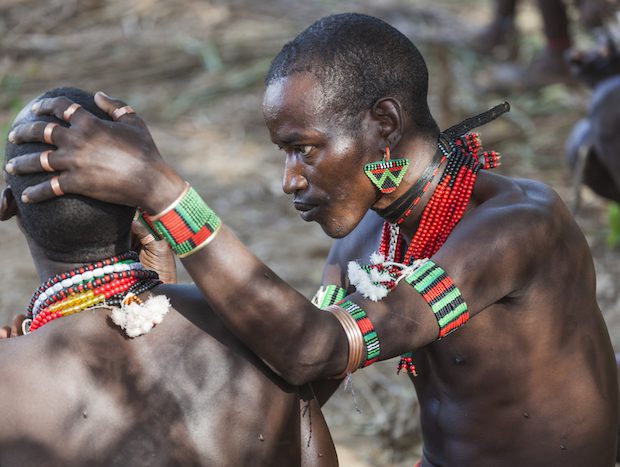Churches & Boys To Men

I was at a conference this weekend wherein one of the speakers touched upon the fact that in America, and the West more generally, there no longer seems to be any definitive “rites of passage.” There seems to be no clear of distinguishing the transition from boyhood to becoming a man. For men in particular, the typical or common “rite of passage” has been work: you become a man (or an adult) when you start working. Now, while there is some truth to this, it neglects the fact that this, of itself, is insufficient. There seems to be no genuine community or body of people to which men can become a member through some defined rite of passage. Thus, without such a reality, young men will be existentially confused, yearning for community, but will settle for a “group.” Instead of people receiving their identity as a gift, from without, their angst (and subsequent anger at not having fulfillment through community) leads to a self-created and artificial identity. While women have a more natural rite of passage through the gift of fertility, this is not so with men. Instead of trying to start more youth programs et al., we need to get serious how helping fathers form robust communities that can aid young men to put off the ego of childhood and grow up, which is certainly an echo of St. Paul.
This seems to be where the Benedict Option is so vital. My friend and I were talking afterwards and we both said that the talk made us think of the Ben Op. The reason why, among others, the Christian churches need to take seriously your arguments is that we have spent the last 25 years or so creating young adult groups which are essentially stunting maturity. Instead of helping young people, boys especially, to grow up, youth ministry programs have been designed to further exacerbate, and extend, immaturity. The adults typically dress like the kids, and it makes me wonder who it is that is ultimately being transformed.
What a challenging thought. Readers, what do you think?
UPDATE: Reader Brian Stahl writes:
I’m a full-time youth minister at my parish. There might be some truth to this, but I think it misses the bigger issues.
The vast, vast majority of youth ministry programs were designed 30-40 years ago. The theory back then was that if the Church invited kids into the school gym to play basketball or sock-soccer or whatever, then the kids would get acquainted with the Church, and think of it as a friendly and good place. The kids might go off to college and get drunk every other weekend, but then they would grow up, want to get married (in a Church, of course, like their parents did and like all their friends were doing), and would want to baptize their child(ren). In the process they would become regular, faithful parishioners.
Does that seem likely anymore? These programs were dependent on a thick cultural background of Christianity. That culture is gone. It’s not enough to have kids dip their toes into the Church; unless youth ministry programs lead them towards a serious, personal encounter with Christ, kids get swallowed whole by the world.
But the Church hasn’t caught up with that truth yet, and so the old model continues to reign. Since many priests and pastors are happy with (or apathetic towards) the old model, they’re content to put 40+ year old unpaid volunteers in charge of their youth ministry. Most of the time, these volunteers are women, and like it or not, female leadership squeezes out the boys, exacerbating the fact that the Church (and religion more broadly) have become effeminized.
This approach is not good enough. Not even close. At least one, full-time, paid employee needs to be put in charge of the program, and it really does help tremendously if that employee is a man. The pastor also needs to take a close interest in the program, show up to events, and devote serious resources towards it.
As to the notion that we aren’t doing a good enough job turning boys into men, there might be some truth to that, but I’m skeptical. I have to work very, very, *VERY* hard to overcome the notion that “youth group is lame” as it is. And so I dive face-first down a slip-n-slide and let the kids throw paint at me and eat a pie without using my hands, because if I didn’t, kids would leave the program, and would leave the Church.
Does that seem self-aggrandizing? If a kid isn’t involved in a youth group in high school, he or she has less than a 10% chance of remaining a practicing Catholic after college. So yeah, getting kids there is really, really important.
And so I allow myself to “act childlishly,” and even that isn’t good enough. Our youth group, which is by far the biggest in our county, has 50-90 kids coming on Sunday. There are approximately 1200 kids in our parish who are in the age range of our group.
But I do the best I can, and as a result, some of my kids come *against the wishes of their parents.* For a lot of parents, baseball practice or a part-time job or getting a 99 instead of a 96 is more important than knowing God. This is what I’m up against. So I make it fun and goofy and, yes, a little childish, because from there, I have an opening to lead them towards an encounter with our Lord. If your commentator can think of a better way to do that, I’m all ears.
